I really think that you should blog. That whatever is getting in your way, you should shove it aside and just write something.
But let’s be honest, my advice is insufficient. As my last couple of posts went up I could just picture some of you saying, “well sure, it’s easy for you, you draw cartoons.”
So I sought out a little help (or rather, a lot of help). Today’s post features expertise from (and cartoons inspired by)…
- Seth Godin (sethgodin.typepad.com)
- Beth Kanter (bethkanter.org)
- Henry Jenkins (henryjenkins.org)
- Robert Kosara (eagereyes.org)
- Jessie Daniels (racismreview.com/blog)
- Nathan Yau (flowingdata.com)
- Lisa Wade (thesocietypages.org/socimages)
- Ewen Le Borgne (km4meu.wordpress.com)
- Tom Murphy (aviewfromthecave.com)
- David Henderson (fullcontactphilanthropy.com)
- Jane Davidson (genuineevaluation.com)
- Molly Engle (blogs.oregonstate.edu/programevaluation)
- Jara Dean-Coffey (jcdpartnerships.com/towhatend)
- Bonnie Koenig (goinginternational.com/blog)
- Stephanie Evergreen (stephanieevergreen.com/blog)
- Karen Anderson (ontopoftheboxeval.wordpress.com)
- Pablo Rodriguez-Bilella (albordedelchaos.com)
- Chi Yan Lam (chiyanlam.com)
- Ann Emery (emeryevaluation.com)
- Sheila B Robinson (sheilabrobinson.com)
- Molly Hamm (mollyhamm.wordpress.com)
- Jamie Clearfield (jclearfield.wordpress.com)
The Questions
I asked two questions, other than the slightly leading nature of the questions (woops, I’ll do better next time), I provided no direction on response length or style, so the responses varied greatly.
1. What’s been your biggest blogging challenge (finding the time, picking good topics, the technology, etc.)?
2. What piece of advice would you give (or have already given) to an evaluator or researcher interested in starting a blog?
Advice and challenges change over time, so it was important to me to reach out to bloggers with a wide range of experience. This post would not exist without the expert help. I’ve thanked each blogger, but if you get anything out of their advice, please send them your own appreciation.
***
A little admin before we get started…I’ve been considering putting together an online workshop on blogging for evaluators and researchers.
The basic approach would involve walking through content development, helping you set up the technology, and talking about strategies for reaching an audience. The workshop would take place on the web and include video tutorials and practical lessons.
I would want to do it right, so this would take a lot of work on my part, and I’ll only set this up if there is enough interest. So if you are interested, sign up here to let me know.
Jamie Clearfield
On challenges
I’d say the biggest challenge for me is actually hitting the publish button. Getting an idea that I think is worth writing about is challenging for sure – but I think the bigger issue is believing in the idea enough to actually put it out on the web. The first blog post sat as a draft for a bit and finally it was a “rip the band-aid off” moment…
Advice
I think the best advice I’ve gotten and would give is to just keep things simple and believe – believe in your ideas and experiences and that there are people who are reading. Don’t over think things too much and have fun.
Molly Hamm
On challenges
Biggest blogging challenge: Keeping up with all of the information from other bloggers in the field while finding time to create your own contributions. I find that it can be easy to get so involved in following other conversations that you forget to add your own two cents! So you may feel as though you are actively participating in blogging and other e-communities while your own blog sits in silence (yes, I need to update my blog!)
Advice
Create a regular schedule for blogging and stick to it. This is something that I really need to work on, but I think it’s important to set a realistic writing goal for your blog (number of posts per week, month, etc.) and then reserve a specific day/time per week/month where you commit to writing on a regular basis. This will ensure that you take the time to gather your thoughts and put them out into the blogosphere.
Also it’s useful to have handy a notepad (tdigital or Post-it!) to jot down inspiration/ideas when they hit. Especially useful to write down ideas as you’re sifting through other blog posts, tweets, reports, websites, e-learning, etc. This allows you to constantly use available information to inform your own writing (reading with a purpose that is actually connected to your blog!)
Sheila B Robinson
On challenges
My biggest challenge is content. I have lots of ideas that spring to mind, but my challenges lie in:
a.) having enough “meat” to go along with an initial idea to flesh it out and write something I think will be relevant, interesting, helpful or useful to someone, and
b.) having the confidence to put it out there – I hold back sometimes thinking about the fact that lots of people are blogging about similar ideas (after all, the “hot topics” are of interest to lots of us), and wondering if I have enough of an original spin on something to create a viable post.
Advice
I would give someone the same advice I received (from someone you know VERY well!) [ed. note: she’s talking about me ![]() ]
]
a.) Just do it! You have virtually nothing to lose. I overcame the concerns about “what if I won’t have enough time or enough content, or enough visitors,” etc. by coming to terms with the fact that if I write something, there it is and it’s fine.
If I don’t have time or content, I simply don’t post. If the blog goes by the wayside and I decide to move on to other projects, I’m OK with that. Holding myself to a weekly schedule didn’t work for me for very long after all, and I’m OK with that. It may very well work for others, so I would advise them to try a schedule and see how it goes.
Blogging is somewhat like dieting – you may have to try different strategies; some may work for a short time, or a long time, or not at all, and you have to be willing to change your strategies based on your results. And your expected results are unique to you. Some people diet to lost weight, some to alleviate a health problem, some to feel better. Some people blog for fun and because they enjoy writing; others do it to build a reputation or clientele, or to sell their products.
b.) Some posts will be more interesting and receive more traffic than others, and so be it. Whether you’re Seth Godin, or Sheila Robinson, traffic will ebb and flow and I’ve learned that that is not what it’s all about for me.
Sure, it’s fun to watch the numbers and I get excited when I get more traffic and people are paying attention to my work. Who wouldn’t? But neither am I crushed when a post fails to generate much interest. It’s all fun for me, and the evaluator in me finds it interesting to look at my data and think about what people like and want to read. But I have nothing to sell right now, so my goals may be different from some others.
Ann Emery
On challenges
At first: Nor having anything to write about.
Now: Having way too much to write about.
Advice
Include an image with every post. Images make your content more share-able (aka a mini version of your image will show up when you and others link to your post on LinkedIn, Facebook, Google+, Pinterest, etc.)… which means more views and more appealing, interesting posts.
Get creative. Avoid those generic stock images. Go for screenshots, photos you took yourself, videos, sketches, and cartoons.
Chi Yan Lam
On challenges
My biggest blogging challenge… probably has to do with finding the time. It takes a real commitment to sit down and produce something of a ‘blah’ quality, let alone something of a ‘wow’ quality. It’s challenging because blogging isn’t particularly accorded any value within academia. (Can it really go no my CV? No.)
Advice
1) I kept a blog for more than a year before gaining any traction. The turning point for me was when I started the 5×52 project. I let go of the idea that I had to write full-length scholarly ‘high-quality’ posts.
I realized that the blog could be a space for my thinking. Instead of insisting on writing for an audience, I wrote for myself. I guess what this boils down to is this: Blogging is simply a platform. There are many successful models of blogging. The important thing is to make blogging goals consistent with one’s goals. Don’t Emulate. Create.
2). I really buy into the whole concept of digitals scholarship. It starts with the belief that no research is good unless communicated. Building on that, I believe that all academics/researchers should engage in knowledge dissemination. For a practical field like ours, it makes sense to engage in digital scholarship — blogging, tweeting, etc…
Pablo Rodriguez-Bilella
On challenges
Being regular and constant has been my biggest blogging challenge. Some (good) months I can write two or three times what I write in others (bad months). I have also tried to have at least a “light post” each week (smartly call “Viernes Light”), but the issue of regularity has also been present there.
I cannot say that I can´t find good topics to pick, usually the problem has been that there are several good topics I would like to write about them.
Advice
Writing a post is usually lot of work, but don´t forget to let the world know about it! You should become a good friend of Facebook, Twitter and LinkedIn, and find the smartest way to post in each of them.
For instance, in LinkedIn you should carefully select the groups more appropriate for your topics, and be careful to not spam every group with your messages (you will receive some warnings before being expelled for not following the etiquette).
Karen Anderson (ontopoftheboxeval.wordpress.com)
On challenges
I’ve been blogging for a couple years now and I’d say the fire burns out for me at times and I can’t think of anything fresh or relevant.
Advice
Don’t start, it becomes quite the addiction. (lol)
look outside of evaluation for inspiration and tips…places like problogger.
Make efforts to engage and partner with bloggers online and offline.
Consitency is king
Find a niche…quick, you don’t want people guessing what they’ll get from you all the time.
Subscribe and comment on other Eval blogs
Have a larger purpose for your blog, what mark do you want to make, what’s the ‘end goal’?
Stephanie Evergreen
On challenges
Opening myself to criticism. Blogging was originally just an outlet for me but as it grew and got attention I realized the world includes people who like to argue and Internet trolls.
Advice
Choose topics you want to learn more about and use the blog as an excuse to bone up on your skills or knowledge a bit.
Bonnie Koenig
On challenges
I haven’t had any particular blogging challenges. Perhaps because I came ‘late to blogging’ compared to many of my colleagues and friends, I asked for a lot of advice before I started blogging and mostly knew what to expect (and perhaps challenges to anticipate).
Advice
Blog when you have something useful to share – don’t be bound by specific timelines and feeling like you ‘have to write something’.
Jara Dean-Coffey
On challenges
I think it is probably two things:
1) Finding a concentrated amount of time (at 2 to 3 hours) to focus in on a topic and then move in to writing a strong enough drive that requires no more than 30 minutes to refine, and
2) Creating a range of voices that speak to our approach, our experiences and reflections that resonate with a variety of audiences and which compel others to take risks, have confidence in their inherent knowing and to strengthen their intentionality.
Advice
Spend some time looking at other people’s blogs and the blogs they read. Find ones that speak to you in terms of perspective and tone.
Ask yourself a few questions (I have a couple worksheets) such as:
a) why do I want to write,
b) what do I want to write about,
c) who is my audience and what interests them,
d) what is my perspective/voice (expert, trainer, synthesizer….) ..etc.
And now, just write. Make yourself a schedule and commit. It doesn’t get any easier unless you practice. Oh, and part of the value I find in blogging is disciplined reflection on my own practice.
Molly Engle
On challenges
My biggest blogging challenge is what to write…there is so much; yet is it timely, needed, wanted? I have to remember that evaluation is an everyday activity…however obscure. (I ignore the technology unless something goes wrong; I am, after all, a technopeasant.)
Advice
Starting a blog—be passionate about your topic; if you are, you will always be able to write something even if it doesn’t seem timely or needed. (chocolate torte, anyone?)
Jane Davidson
On challenges
Definitely finding the time! Patricia and I started strong but seem to have been so swamped with other things that it is difficult to get much up on the blog. But, we would rather do good stuff less often than just fill the space for the sake of it.
Advice
The blogs I love the most are the ones where the bloggers’ personalities and senses of humor shine clearly through. Write good, thought-provoking stuff, but don’t be shy about putting your own signature spin on it.
The nice thing about blogs is that people deliberately opt to tune intoyou – unlike discussion lists, where we have to be conscious of chewing up too much of the airspace. Don’t swamp people with too much content, but make whatever you put out there fun to read! And a cute cartoon will do wonders as well! ![]()
David Henderson
On challenges
Finding the time is a good excuse, but I am too intimately aware of my stupid internet browsing habits to justifiably argue I don’t have time to blog.
I think more challenging is not to psych myself out. I will regularly start posts all to decide that whatever “insight” I’m writing about feels so plainly obvious to me, that it wouldn’t be valuable to anyone else, and then scrap the post all together.
Advice
There’s a lot of crap and dubious advice out there. I always encourage folks who want to start blogging to not be afraid to elevate their posts above the all too common nonprofit blogging dribble.
I like to think about blogs as light version of a research report or paper. In this framing, blog posts are not totally absolved of the constraints of substantiating arguments and citing sources. The best bloggers are those who I learn from. To that end, I’d advise new bloggers to think about blogging as (at least in part) a teaching platform.
Tom Murphy
On challenges
For me it is still getting over publishing and putting myself out there. Even when I am doing more of a reported story than a blog/opinion I feel a sort of resistance to publishing and the vulnerability that comes with it once it is out there. The other stuff is relatively easy for me at this point, but there is that fear of rejection or failure that immediately follows hitting the publish button.
Advice
Think of it as an extension of what you are already doing. You are reading and pulling together a lot of information and resources about what you know best. Blogging is a public way to gather that information, make a few notes and share with others.
The benefits are that people will interact with you. It can foster connections and potential suggestions/opportunities that may not have existed prior. Also, there is the fact that there is evidence showing how blogging about research can lead to more citations and reads of published works. As long as the person does not say anything improper, blogging is a great support for a researcher’s work.
Ewen Le Borgne
On challenges
Originally it was the discipline to get at blogging and to carve out time for it. It took me 2 years to become a regular blogger but at some point it clicked and became a bit of an addiction – of the nice type though!
No, more recently I find that the challenge has been to precisely reverse the engine and to perhaps blog a bit less but really aim at good quality posts – the wow posts you mentioned. I sometimes post a piece that I know I’m not too happy with – but it’s sometimes difficult to resist the instant gratification of getting a post out there and seeing the reactions.
Advice
First off, to find out that they are not alone in this and to look at other testimonials and experiences from other researcher/evaluator bloggers (it’s likely to be much more convincing coming from their peers than from any other source), then to think carefully about the focus of their blog and its relation with their organisation/clients etc. This can become a thorny issue so it deserves a bit of thinking.
The rest is just fly and fly higher, trial and error, reflection all along the way, engagement… and fun! My personal motto if ‘fun, focus and feedback’ and I think it suits blogging pretty well ![]()
Lisa Wade
On challenges
Thinking big picture, one of the biggest and most exciting challenges is change. Adapting to unexpected change started right away.
When we started blogging six years ago, the idea was that it would be a place for my sociology instructor friends to swap images we were using in teaching. As more and more people started reading who weren’t sociologists, we had the opportunity to adapt the site, making it a place for anyone interested in sociological commentary. The result was a lot more work and responsibility, but the reward was proportionally exciting.
Technological change has also offered both opportunities and new demands. When we started, blogs were just blogs. As the years have gone by, the importance of being on Facebook (especially) and Twitter (secondarily so) and the fun possibilities of things like Pinterest have emerged. Now it isn’t just Sociological Images, it’s Sociological Images and its auxiliary sites. These are now all part of the day-to-day work and reward of the site.
Finally, my own career has changed in ways that I never anticipated. The blog has made me more visible as a social commentator and I’ve had wonderful opportunities to speak to journalists, write for well-known outlets, and travel for public speaking.
Together, the rising readership, expanding reach of the site, and the new dimension to my career has required me to adapt many times over. It’s been a fun, but wild ride.
Advice
Academic blogging is, I believe, win-win. As a community, the more we share each others material and try to draw attention to each other, the more social science will become a go-to way of thinking about social problems.
So, if you’re interested in starting a site, think about all other sites as your friend. Borrow their content, let them borrow yours. Talk them up and refer people there. Link and link again.
When we all do our best to draw attention to social science as a lens, more and more people will visit all of our sites. When they do that, the policy makers, voters, and Thanksgiving table debaters all become better able to understand our world and help others understand too. And that’s a wonderful thing.
Nathan Yau
On challenges
The biggest challenged with FlowingData is probably maintaining the right balance between academic and casual. If I get too technical, I confuse a lot of readers, but I can’t get too casual, because I might oversimplify concepts that are actually complex.
Advice
It’s really easy to start a blog these days, so you might as well try it out. Some researchers might be worried that the general public will misunderstand findings, but it’s a great chance for you to explain what you do and involve yourself with groups of people who are excited about the same stuff as you.
Jessie Daniels
On challenges
I would say that the biggest challenge with blogging has to do with time. And, by this, I don’t mean “finding the time” to blog, but more to do with pacing.
I’ve been blogging at Racism Review since 2007, along with Joe Feagin, the blog’s co-founder (and, long ago, my dissertation chair). Ours is a scholarly blog, so we’re always trying to take some current event or news item and reflect it through the research literature to add a new dimension. The pace of how quickly things happen online and the pace of how slowly scholarly research happens are really at odds with each other. I often find that by the time I’ve really thought deeply about some item rippling through Internet, the moment of when that is ‘new’ has long since passed.
The other challenge that has to do with pacing is thinking about the long haul. We’ve been blogging since April, 2007 which, according to my math, is a little over six years. When we first started it, we tried to blog every day. Posting every single day is a pretty daunting pace to keep up with over a long period of time. To help ease that burden, we’ve tried to enlist as many ‘guest bloggers’ and additional contributors as possible, but sometimes cajoling other academics into blogging presents its own set of challenges. In general, I think we’ve done pretty well keeping it up given that Joe and I have very busy academic lives beyond the blog.
Advice
I get asked for advice about blogging fairly often and my biggest advice is to figure out what your particular niche or formula is. As I mentioned, at Racism Review, we try to connect current events having to do with race or racism to solid academic research. Having a really very clear, specific idea at the outset about what your contribution will be makes it much easier to get started and to maintain it over time.
Robert Kosara
On challenges
There is an obvious answer here and there is a somewhat deeper one. Of course it’s a challenge to find the time. I could do other things. I could read. I could sleep. I could go for a run.
I think the biggest challenge has been to find the right direction for this blog. After almost six years, I’m still not sure where this thing is going. I keep changing direction. Sometimes, somebody tells me they do or don’t like something. But I don’t have a clearly defined audience like a fashion blog or a technology blog or similar.
It’s not that there aren’t enough good topics, there are more than I could ever write about. Rather, the question is what do I think I can contribute to? I don’t care about just posting links to interesting stuff, others do that already and I can’t bring myself to just summarize what somebody else has done for a link posting.
The challenge is to not let that paralyze you. I keep a list of topics in my todo program, in a folder. When I don’t know what to write, I look through those and pick one. You need to keep writing, and you need to try things to see if they work. A simple posting today, a little visualization project next week, then a book review, etc.
To summarize it in a word, perhaps the biggest challenge is consistency. Consistency in topics, style, and frequency.
Advice
I have three pieces of advice.
1) Don’t worry about the technology. Don’t tinker. Just write.
2) Pick an audience to write for, but don’t get too focused on that. Your audience might change. People you wouldn’t have expected to read your blog will read it. Be prepared to go outside the box and change direction accordingly. But to write reasonably well, you need to have an idea of who you’re writing for.
3) Hang in there. Nobody will read your blog at first. Nobody. After a year, you might have a few readers. Don’t give up. A blog doesn’t just explode onto the Internet (unless you’re incredibly lucky). It’s going to take time. If you give up after a few months with just a few readers, you will never get more.
Henry Jenkins
On challenges
Before I started blogging, the biggest concern I had was whether I would have the time to keep up with my blog. The advice I got from Cory Doctorow (Boing Boing) was “make the time.” And he was right.
Advice
For me, a key is integrating the blog into the broader range of activities I am doing, so I am always looking for ways to use the blog in my teaching, my research, my recreation life, my friendships. You need to decide going in how often you are going to blog and stick to it like you would do any other deadline.
On any given day, there is always going to be something more pressing than blogging, so if you do not think of it as a responsibility to yourself and your readers, you will slow down and eventually stop. I think of it as like a journalist putting out a daily edition, i.e. it’s a deadline that must be met.
I put it out at a consistent time on a consistent day and I can count on my fingers the number of times I have missed a deadline since I started my blog in 2006. When I need to take a break, I announce that I am doing so and give myself permission for downtime, but I do not miss a deadline arbitrarily on a day in, day out basis.
Given the complexities of my life, this means I am planning further and further ahead, so I have a fall back if a piece of content fails to materialize. For this to work, I end up balancing between topical issues and ever-green content that I hold in reserve in case I am facing a hole on any given day that needs to be filled.
Beth Kanter
On challenges
I’ve been blogging for ten years now. I love it. I look at it my personal learning time and I try carve out a half hour or hour every day to write about something. This reflection time is so important. But, with that said, what’s hard is to keep up the discipline so I make the time to reflect and write every day. Sometimes with a busy speaking schedule and client work, it is hard to do.
My biggest challenge is when I get bored … when my muse goes into hiding. Sometimes, I’m so excited new developments or new angles on topics that I’ve been writing about – but there are some times that ennui creeps in. What I do is allow myself to write about a slightly different or adjacent topic or recruit guest bloggers and take a break.
Advice
Look at your blogging time as a form of professional development and a commitment to write something regularly. Don’t get caught up with making it perfect either …. a blog is different from writing a research article.
Seth Godin
On challenges
Decide on the audience you want and ignore everyone else.
Advice
Write every single day. If something you write spreads to the audience you care about, and if it changes them in the way you hope, write more like that.
Discussion
Are you a blogger, if so, what are your biggest challenges? Have any advice to share, or reiterate?
Not a blogger, why not? What’s holding you back?
Let me know in the comments.
~ This post is by Chris Lysy and originally appeared at FreshSpectrum; it is re-blogged here with permission.

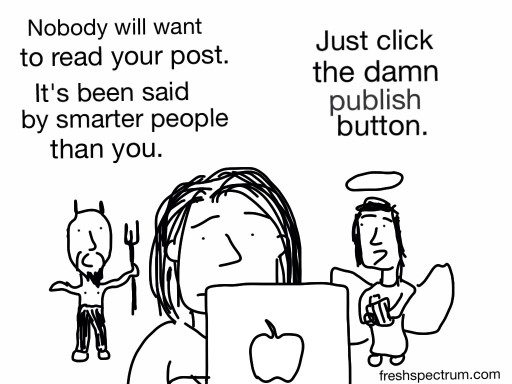
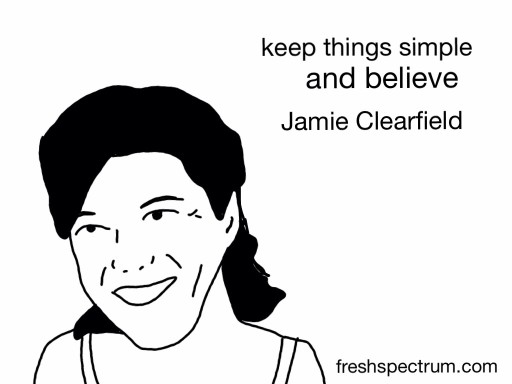




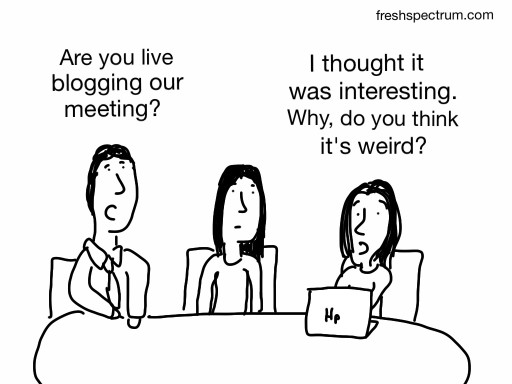







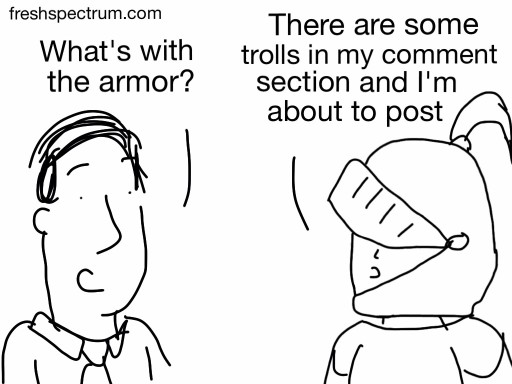


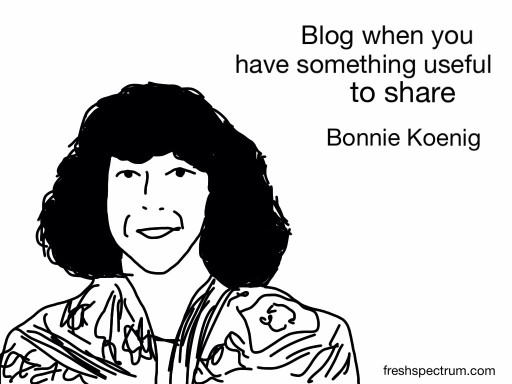
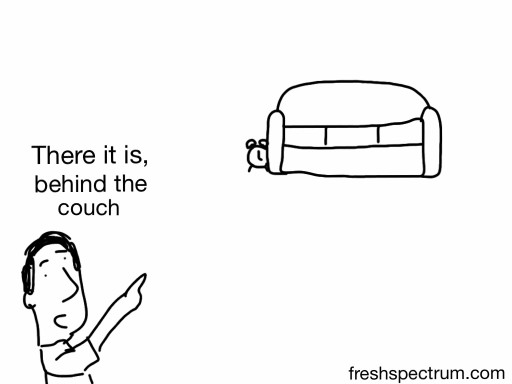
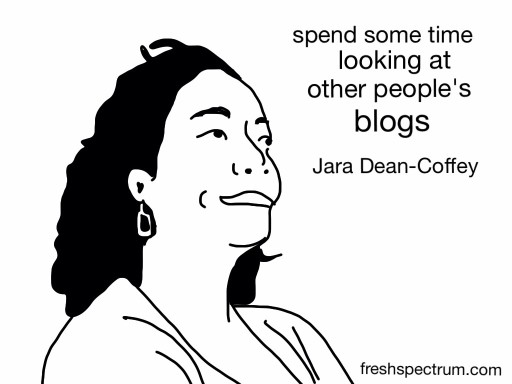

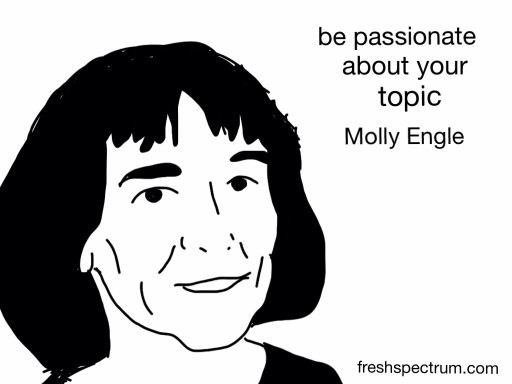
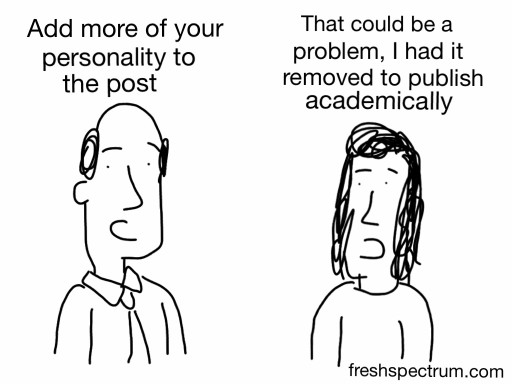

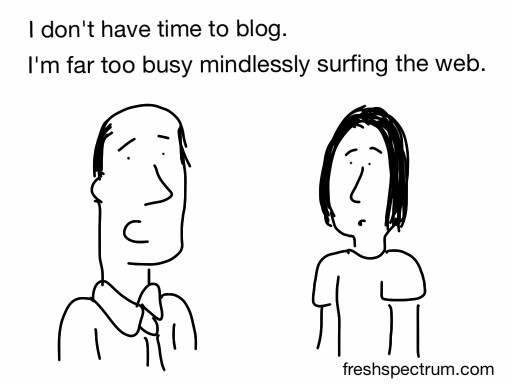

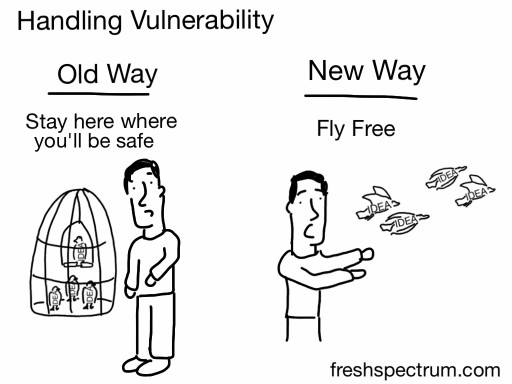
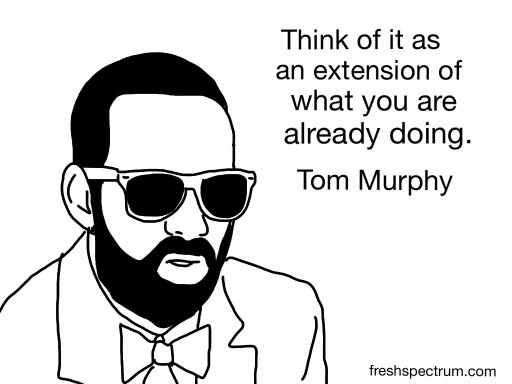
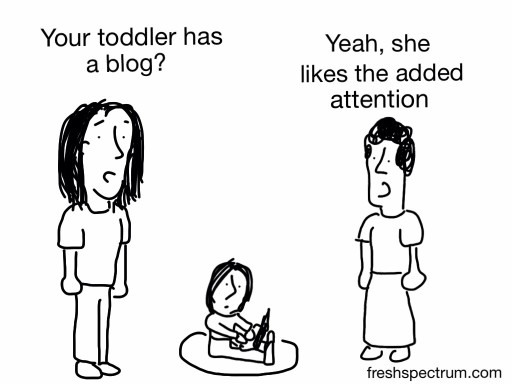
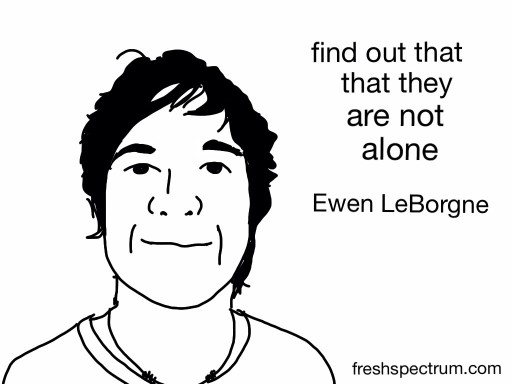
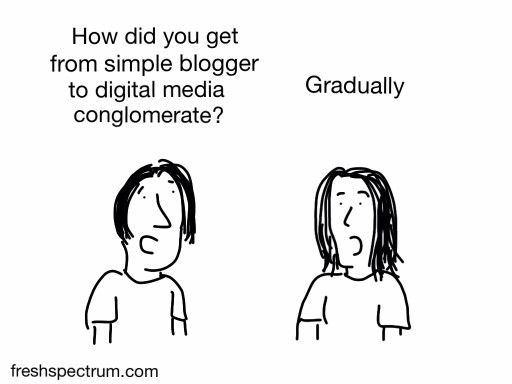

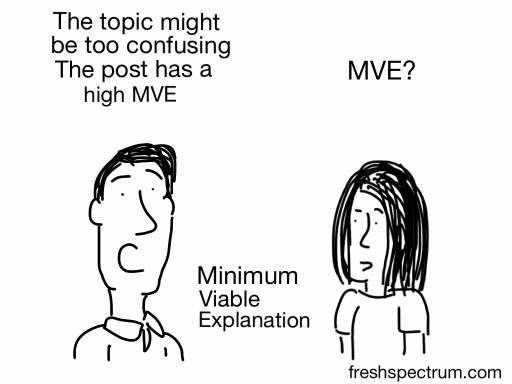

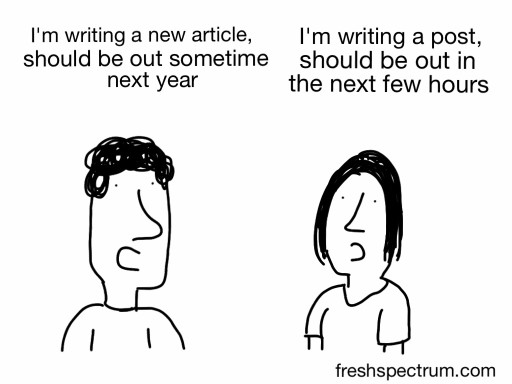

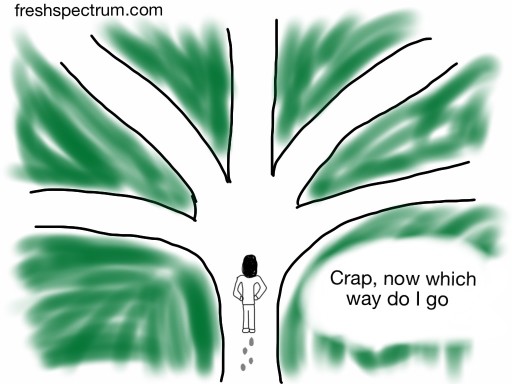



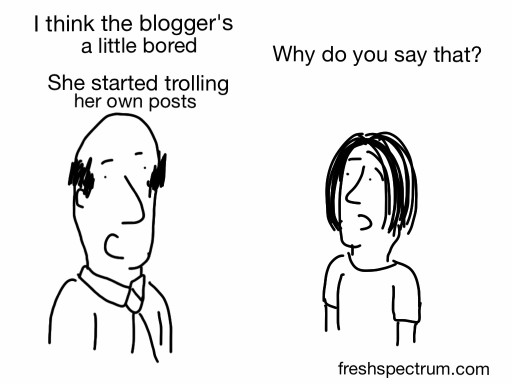

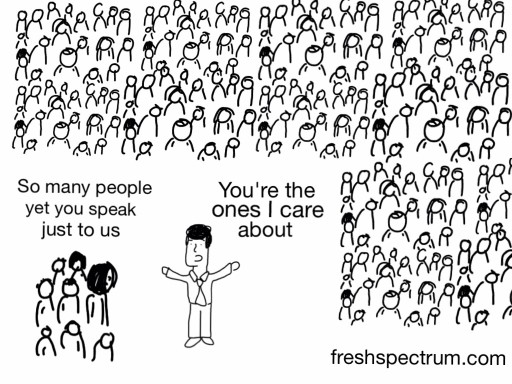
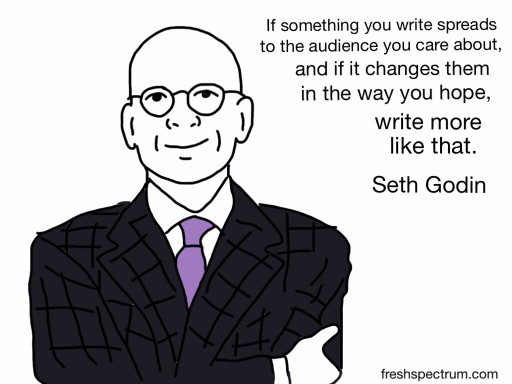


Pingback: » An Illustrated Guide to Academic Blogging The Sociological Imagination